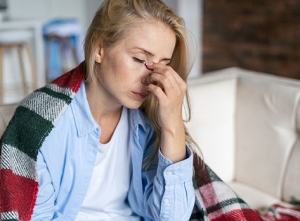
It’s that time of year: the flowers are blooming, trees are flowering and the grass is turning green again. But for millions of people, warm weather is also the start of allergy season. Each spring, Noha Eltaki, MD, a family medicine doctor with Atlantic Health System, sees a spike in patients searching for ways to combat their seasonal allergy symptoms.
Seasonal allergy symptoms
Seasonal allergies are most often triggered by pollen found in flowers, trees and grasses. The most common symptoms include:
- Sneezing
- Sinus congestion
- Runny nose
- Itchy or sore throat
- Watery eyes
- Coughing
“It can be difficult to tell the difference between allergies and a common cold,” says Dr. Eltaki. “With allergies, patients typically have a runny nose or sinus congestion for several days. However, they generally don’t develop worsening symptoms.”
Treatments for seasonal allergy symptoms
There are many over-the-counter medications available for treating seasonal allergies. To help patients find relief, Dr. Eltaki recommends using one oral antihistamine along with one nasal antihistamine or nasal steroid.
Antihistamines include:
- Cetirizine (Zyrtec)
- Fexofenadine (Allegra)
- Loratadine (Claritin)
- Azelastine (Astelin)
Examples of nasal steroids:
- Fluticasone propionate (Flonase)
- Budesonide (Rhinocort)
- Triamcinolone (Nasacort)
She suggests taking medications early in the day when pollen counts are high. Dr. Eltaki also stresses that you need to use your treatments for at least two weeks to determine if they are effective.
Another helpful option can be saline nose sprays or a neti pot. Dr. Eltaki reminds patients to always use purified water with any type of sinus rinse. Using a humidifier at night can also help keep nasal passages moist and reduce postnasal drip, a common cause of nighttime coughing.
In addition to medications, Dr. Eltaki suggests the following steps to limit exposure to allergy triggers:
- Avoid spending time outside in the morning when pollen counts are highest.
- Shower at night to wash away pollen.
- Remove your shoes and change your clothes after spending time outside.
- Sleep with windows and doors closed.
- Run your air conditioner when possible and change the filters regularly.
- Don’t hang laundry outside to dry.
When home treatments aren’t enough
As pollen counts change, so can your allergy symptoms. However, if you develop productive phlegm, body aches, chills or fever, that could indicate a viral or bacterial illness. Additionally, you might also have sinus, tonsil or ear infections because of worsening or untreated allergies. If you struggle with asthma or eczema, you might find your condition becomes worse during allergy season.
If you have severe allergy symptoms, testing might help to determine more targeted treatment options. Allergy shots are also available to lessen the severity of allergy symptoms through desensitization to specific allergens.
Fortunately, allergy medications have come a long way in recent years and most patients find success treating their symptoms at home.
“If bothersome allergy symptoms continue after pollen counts die down, or if you are struggling with day-to-day activities, a visit to a doctor is a good idea,” says Dr. Eltaki. “We have additional resources available for folks with ongoing complaints and we are always here to help.”
Be Proactive About Your Health
To stay safe and healthy, it's good to have a primary care provider who knows and understands your health history and wellness goals.
Related Articles
Is It a Cold or Allergies? Here’s How to Know
With the spring upon us, you might wonder if your sniffles are from seasonal allergies or the common cold. Learn how to spot the difference.
Five Reasons to Connect With Your Primary Care Doctor
Keeping up with your heart health begins with your primary care doctor. Discover how staying up to date with your annual visits can keep you well -- and prevent or detect serious medical issues at their earliest stages.
How Much Exercise Do We Really Need?
How much exercise is enough to keep us healthy? When it comes to the amount of exercise needed for health and longevity, one size does not fit all. An Atlantic Health physician expert shares exercise recommendations.


